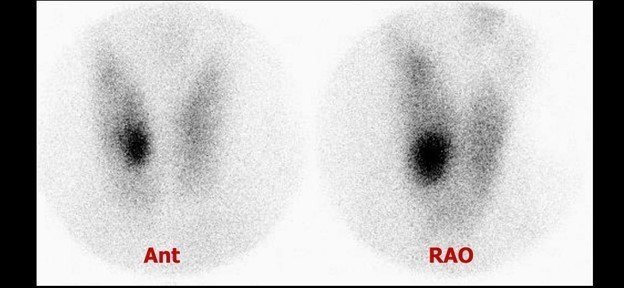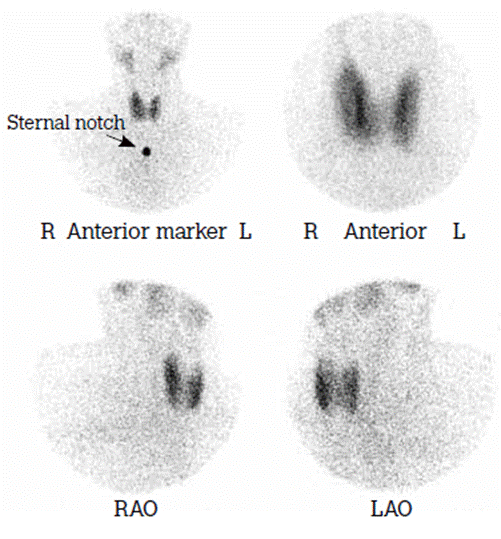Nuclear Medicine Thyroid Uptake & Scan - Top 3 Things to Know

Do I need a Nuclear Medicine Thyroid Uptake & Scan?
The short answer is no, very few patients with thyroid disease need a nuclear medicine thyroid uptake & scan.
What is a nuclear medicine thyroid uptake scan?
This is a special test that looks primarily at how the thyroid is functioning in terms of taking up iodine and making thyroid hormone (more on that below). You may also see this test called a nuclear medicine thyroid scan, radioactive iodine thyroid scan, radioiodine thyroid scan, thyroid scan and uptake, and more.
In modern medicine, an expert high-resolution thyroid ultrasound along with improved laboratory studies have significantly reduced the need for this imaging test. A nuclear medicine thyroid scan is only useful in a couple select clinical scenarios. If your doctor or provider does not order a thyroid ultrasound and labs before this test, you need to find a new doctor who is more up to date on thyroid disease, diagnosis, and treatment.
Below are the top 3 things to know about a nuclear medicine thyroid uptake & scan.
Top 3 Things to Know About a Nuclear Medicine Thyroid Uptake & Scan
#1 Thing to Know About a Thyroid Uptake Scan: If your thyroid hormone levels are not high (hyperthyroidism), you do not need this scan.
Simply stated, if your thyroid levels (TSH, free T3, and free T4) are all normal, you do not need a nuclear medicine thyroid uptake & scan. I would even advocate further that this test is only beneficial for patients with hyperthyroidism (overactive thyroid with low TSH and elevated free T3 and/or free T4 levels) that have nodules. In these circumstances, the thyroid uptake & scan can be used to see if there is a hot or toxic nodule that is causing hyperthyroidism (Image 1 below). A toxic thyroid nodule is one that has gone rogue and is producing thyroid hormone almost non-stop when the body does not need thyroid hormone. This leads to elevated free T3 and/or free T4 levels with a low or undetectable TSH (thyroid stimulating hormone) level.
Many years ago, the nuclear medicine thyroid uptake & scan was used more frequently to assess thyroid function (overactive thyroid, Graves’ disease, etc.) and look for “cold” and “hot” nodules. The thinking was physicians could gain information on thyroid function and that cold nodules were more concerning from a cancer standpoint. The reality is, most nodules are not cancerous or hot, and the vast majority of hot or toxic nodules are not cancerous. Furthermore, an expert, high-resolution ultrasound is best to evaluate the thyroid, nodules, and lymph nodes in the neck for thyroid cancer. Thus, nuclear medicine thyroid uptake and scan imaging test is not very useful to screen for thyroid cancer or nodules. Additionally, from a functional standpoint, laboratory tests have improved significantly in the past 30-40+ years, and thyroid function is better assessed with simple blood tests as opposed to the two-day radioiodine thyroid uptake & scan. Furthermore, Graves’ disease, an autoimmune disease, that is the most common cause of an overactive thyroid is easily diagnosed by measuring antibody levels in the blood. A two- day nuclear medicine thyroid uptake and scan using radioactive iodine is not needed to diagnose this or hyperthyroidism. In summary, this test is rarely indicated and only provides useful information in a couple select clinical scenarios.

Image 1: Two views of a hot nodule in the right thyroid lobe
#1 Thing to Know About a Thyroid Uptake Scan: This is a two- day test using a radiolabeled iodine.
This test uses small amounts of radioactive iodine to assess how the thyroid and any thyroid nodules are functioning. This imaging test is painless. The nuclear medicine thyroid uptake & scan involves 2-3 visits over 2 days to complete. You will receive instructions from the imaging center or radiology department about what to do in the 4-6 weeks leading up to the test. Pay close attention to instructions on when to stop anti-thyroid medications (Methimazole, Propylthiouracil, etc.), iodine supplements, thyroid hormone medication, diet day of and after the imaging test, and more.
The first part of the nuclear medicine thyroid uptake & scan test involves taking a tasteless radiolabeled iodine pill (radiotracer) by mouth. This has very low level of radioactivity with no side effects. The second step occurs 4-6 hours later when the uptake (absorption) of the radiolabeled iodine is measured using a special probe. This is measured as a percentage at the 4 or 6- hour mark and 24- hour mark and given with normal range. Sometimes, a nuclear medicine thyroid scan is done at this time as well using a special gamma camera.
The second part of the nuclear medicine thyroid uptake & scan occurs 24 hours after the radioactive iodine pill is taken. The patient returns and has the uptake measured again. The scan then involves an IV (intravenous) catheter that is placed in the arm followed by injection of the radiotracer. The gamma camera is then used to take pictures of the thyroid 15-30 minutes later. The gamma camera is close to the neck and does not emit radiation. Image 2 shows the result of a nuclear medicine thyroid scan. Once the test is done, drink plenty of water. The small amount of radioactive iodine will decay over time (radioactive decay) and is also excreted from the body via urine or stool.

Image 1: Nuclear medicine thyroid scan images
#1 Thing to Know About a Thyroid Uptake Scan: This should not be one of the first tests ordered for thyroid disease.
The first step in assessing or diagnosing thyroid disease involves a high-resolution ultrasound of the thyroid and lymph nodes in the neck along with simple blood tests to evaluate thyroid function and physiology. In cases where thyroid function is abnormal, further bloodwork to look for autoimmune thyroid disease is done. If your doctor or provider is ordering a nuclear medicine thyroid uptake & scan as the first test to work-up possible thyroid disease, cancer, or a thyroid nodule, you need to seek care from an expert physician or surgeon with experience in thyroid disease.
Thyroid nodules, cancer, Graves’ disease, and thyroid function are more accurately and completely assessed with the aforementioned tests and imaging. A two-day nuclear medicine thyroid uptake & scan is useful to determine if a thyroid nodule is hot or toxic, but this would be the 3rd or 4th test ordered in the work-up only after a nodule is diagnosed and hyperthyroidism (or subclinical/borderline hyperthyroidism) is diagnosed with lab studies. The nuclear medicine thyroid uptake & scan is not a screening test to look for or begin the work-up of thyroid disease.
Nuclear Medicine Thyroid Uptake & Scan Summary
The nuclear medicine thyroid uptake and scan is a two- day test using radiolabeled iodine to evaluate the function of the thyroid and give information about thyroid nodules in the setting of hyperthyroidism (or subclinical hyperthyroidism). This test should not be ordered initially to begin the work-up of thyroid disease, thyroid cancer, or thyroid nodules. Essentially, the only clinical scenario calls for this imaging test is when a patient has hyperthyroidism or subclinical hyperthyroidism not caused by Graves’ disease along with a nodule or nodules that may be toxic. Thyroid nodules and thyroid disease are much more thoroughly and completely assessed with simple blood tests and an expert high-resolution ultrasound.
Our team of thyroid experts is here to help and guide you every step along the way during the diagnosis and surgery for your thyroid disease. The Clayman Thyroid Center is dedicated to providing world-class care for thyroid cancer and thyroid disease. To learn more and become a patient, please see our resources below.
Additional Resources
- Become our patient at www.thyroidcancer.com/become-a-patient
- Learn more about the The Clayman Thyroid Center at www.thyroidcancer.com
- Learn more about our specialized Hospital for Endocrine Surgery
- Learn more about our thyroid ultrasound screening program for the Tampa community.